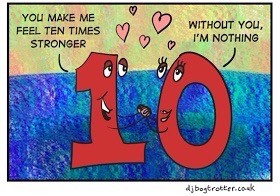I’m not quite sure I have the same love for mathematics as the numbers above….however, I can say that my fear of maths has reduced dramatically over the course of this Discovering Mathematics elective!
I have just finished my assignment about having a ‘Profound Understanding of Fundamental Mathematics’ and I have Liping Ma to thank for making those four elements of PUFM torment me every night for the last 3 weeks whilst trying to get to sleep – CONNECTEDNESS, BASIC IDEAS,MULTIPLE PERSPECTIVES and LONGITUDINAL COHERENCE. It has taken me the length of the elective to get my head round these 4 elements and be able to apply them to my own mathematics experiences and to our lectures. I am grateful to Ma as It has been very beneficial being able to view maths as a coherent whole. I feel through my engagement with the lectures and wider reading, I have started to repair my fragmented view of mathematics as I begin to open up the underlying network between different mathematical concepts.
ENJOYMENT
Looking back over the discovering mathematics elective, I wanted to pick out a particular lecture that I enjoyed and show how it helped develop my understanding of how mathematics can be used in wider society.
Maths – Data & Statistics (Dr Elanor Hothersall)
During this lecture we had a guest speaker, Dr Hotersall, who works for NHS Tayside as a consultant in public health. Dr Hotersall was quick to identify one of the main barriers for individuals working in the health profession – a lack of understanding of the basic mathematical concepts. This was in regard to nurses and doctors calculating drug dosages, fluid prescriptions, concentrations of medications, interpreting research and probabilities which leads to treatment decisions, biomechanics and in particular pharmacodynamics (what happens to your body when you swallow medicine). To be honest, before this talk, I never really considered the underpinning mathematical literacy that was required to work in the health field, yet I would want to be fully confident that my nurse/doctor was competent enough in mathematics to prescribe me the correct drug dose and be able to calculate the correct reduced dose if they were treating my son. Dr Hothersall also went on to discuss how in her job she regularly has to compare health information and statistics, identify patterns and anomalies in results and decide acceptable levels of variation. Overall it was a fascinating lecture and really made me think deeply about how basic mathematical ideas and concepts can be crucial when working in such an important profession.
Where do I go from here?
Although my maths anxiety has reduced from the start of this elective it is still clear in my mind that I need to participate in professional development by continuing to engage with mathematics topics, courses and training opportunities. I need to work hard to develop my confidence and understanding of basic mathematical concepts if I am going to be able to explain them well to my pupils and encourage them to explore them with confidence. It is really important to me that I do not allow my pupils to experience any negativity when it comes to maths. I want mistakes to be welcomed as long as we can work back from them, see why it went wrong and then discuss, debate and predict how we could get to the right answer. Collaboration and discussion is going to be vital to achieving success in my maths classroom! I like to talk things through and feel that children will benefit from dialogue when working through mathematical processes. I am happy with the wide variety or research I have done for this elective and I feel that my blogs show a high level of engagement with my professional development.
I want to thank Richard and Tara for all their lectures and hard work throughout the module – especially for putting up with my puzzled face and silly little questions. Also a big thanks to all the guest lecturers who provided us with a good insight into how fundamental mathematics can be applied in wider society and to other professions beyond educational applications.


